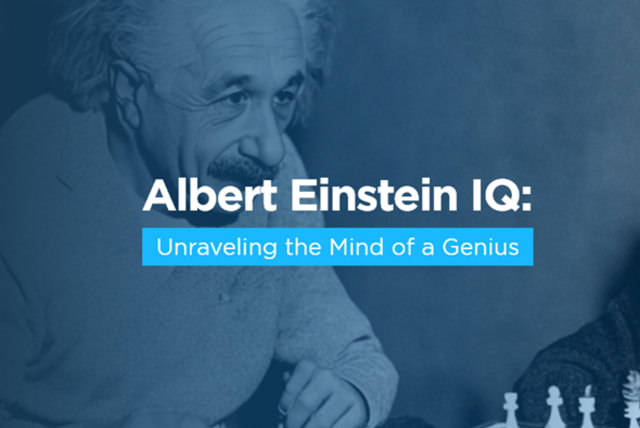Albert Einstein IQ: Unraveling the Mind of a Genius

One of the most pervasive topics of intrigue in the realm of intellectual achievement revolves around the Albert Einstein IQ. It's a subject that prompts fascination and admiration, embodying the idea of exceptional cognitive ability. Albert Einstein, the theoretical physicist who redefined our understanding of the physical world, is often the benchmark when discussing intellectual prowess. This article aims to illuminate the topic of "Albert Einstein IQ", exploring what we know about the great physicist's intellect, how it shaped his contributions to science, and what it means for our understanding of intelligence today.
Delving into the topic of "Albert Einstein IQ" and high IQs in general opens up an interesting intellectual avenue. Why not further explore this captivating world with a firsthand experience?
Engage with your curiosity and take an online IQ test today >>. The journey of self-discovery starts with a single step - take yours now.
Albert Einstein IQ: Unraveling the Mystery
When discussing Albert Einstein's IQ, we first encounter an interesting fact: Einstein himself never took a formal IQ test. Therefore, any claim about his exact IQ score is speculative. Despite this, based on his significant contributions to theoretical physics and his ability to think in innovative ways, experts widely agree that his IQ would have been well above average, possibly even within the "genius" range (typically considered as an IQ over 140).
Einstein: The Intellectual Paragon
Einstein's intellectual capabilities extend far beyond a mere number. His ability to visualize complex physical phenomena and translate them into mathematical language resulted in ground-breaking theories that revolutionized our understanding of the universe. This includes the Special Theory of Relativity and the General Theory of Relativity, leading to the famous equation E=mc^2. The term "Albert Einstein IQ" often symbolizes this extraordinary capacity for scientific innovation and intellectual curiosity.
Beyond IQ: The Einsteinian Mind
A deeper exploration of "Albert Einstein IQ" should also take into account the physicist's unique approach to problem-solving. He frequently used "thought experiments" - mental simulations of physical situations - to test and form his theories. This capacity to approach problems in unique ways may not be captured entirely by an IQ score but is undoubtedly a significant part of Einstein's intellectual genius.
The Albert Einstein IQ in Today's Context
In the present context, "Albert Einstein IQ" serves as a symbol of intellectual achievement and a pinnacle of cognitive ability. Yet, it's crucial to remember that Einstein's genius was not merely a product of raw intelligence, as might be measured by an IQ test. It also involved creativity, curiosity, perseverance, and the courage to challenge established ideas.
Exploring High IQ: Beyond Albert Einstein
While the term "Albert Einstein IQ" has become synonymous with intellectual brilliance, many other famous individuals throughout history have demonstrated exceptional cognitive abilities. Here, we'll turn the spotlight onto some of these intellectual powerhouses, whose high IQs have contributed to their significant achievements in various fields.
1. Isaac Newton: This influential physicist and mathematician, best known for his laws of motion and universal gravitation, is often considered one of the smartest individuals in history. Like Einstein, Newton never took a formal IQ test. However, experts estimate his IQ to have been exceedingly high, given his profound contributions to science.
2. Leonardo da Vinci: A renowned polymath, da Vinci's brilliance extended across art, engineering, anatomy, and several other fields. His ability to excel in such diverse areas suggests an exceptionally high IQ, perhaps within the "genius" range.
3. Marilyn vos Savant: Listed in the Guinness Book of World Records for the highest recorded IQ, vos Savant is a columnist, author, and playwright. Her exceptional cognitive abilities highlight that a high IQ isn't confined to scientific or mathematical fields.
4. Stephen Hawking: Theoretical physicist Hawking, known for his work on black holes and relativity, demonstrated extraordinary intellectual capacity throughout his life. His unique ability to visualize complex physical systems—similar to Einstein—indicates a very high IQ.
5. Judit Polgar: The youngest Chess Grandmaster at the age of 15, Polgar's strategic prowess and problem-solving skills signify a high IQ. Her accomplishments serve as a reminder of the many ways in which exceptional cognitive abilities can manifest.
As we explore these examples alongside the "Albert Einstein IQ", it's crucial to remember that while a high IQ can indicate exceptional cognitive abilities, it is but one measure of intelligence. Factors such as creativity, curiosity, dedication, and the ability to think outside the box play equally vital roles in achieving intellectual greatness.
Q&A Section: Decoding the Phenomenon of High IQs
What is meant by 'Albert Einstein IQ'?
The term "Albert Einstein IQ" refers to the speculated high level of intelligence of physicist Albert Einstein. It's important to note, though, that Einstein never took a formal IQ test. His estimated high IQ is inferred from his significant contributions to theoretical physics and his innovative thinking abilities.
What is considered a 'genius' IQ score?
While there's some variation in definitions, a score of around 140 or above on an IQ test is often considered within the 'genius' range. However, IQ is just one measure of intelligence, and a high IQ score doesn't necessarily equate to 'genius' in a broader sense.
Are high IQ scores common among famous intellectuals?
Many renowned intellectuals, such as Isaac Newton and Leonardo da Vinci, likely had high IQs, given their groundbreaking contributions in their respective fields. However, like Einstein, many never took a formal IQ test. A high IQ can certainly support significant achievements, but it's just one aspect of what can make someone a successful intellectual.
How does 'Albert Einstein IQ' relate to our understanding of intelligence today?
The fascination with "Albert Einstein IQ" reflects our broader interest in exceptional cognitive abilities. Yet, contemporary understanding of intelligence recognizes it as multi-faceted. In addition to cognitive abilities measured by IQ, factors like creativity, curiosity, emotional intelligence, and resilience are now considered integral aspects of intelligence.
What can we learn from studying high IQs?
Studying high IQs, like the speculated "Albert Einstein IQ", can provide insights into exceptional cognitive abilities. However, it's essential to remember that these cases are extraordinary. Intelligence is diverse, and it can manifest in a multitude of ways that an IQ score alone might not capture.
Conclusion: The Enigma of Albert Einstein's IQ
As we examine the concept of "Albert Einstein IQ", it becomes clear that intelligence extends far beyond a mere number. Einstein's unparalleled intellectual achievements stemmed not only from exceptional cognitive abilities but also from his curiosity, creativity, and audacity in challenging the status quo. While it's fascinating to ponder the cognitive capabilities of this scientific luminary, it's equally, if not more, important to appreciate these other qualities that contributed to his genius.
Continue Your IQ Exploration
Now that you've delved into the realm of "Albert Einstein IQ" and the intrigue of high IQs, you might be curious about which IQ tests best gauge cognitive abilities.
In my article titled "Top IQ Test to Measure Your Intelligence >>" I have compiled a list of the most reliable and insightful IQ tests available. This piece serves as a guide to help you navigate the diverse offerings of online IQ tests.
I invite you to read this article and continue your exploration of the fascinating world of IQ and cognitive abilities.
This article was written in cooperation with Adcore
Jerusalem Post Store
`; document.getElementById("linkPremium").innerHTML = cont; var divWithLink = document.getElementById("premium-link"); if (divWithLink !== null && divWithLink !== 'undefined') { divWithLink.style.border = "solid 1px #cb0f3e"; divWithLink.style.textAlign = "center"; divWithLink.style.marginBottom = "15px"; divWithLink.style.marginTop = "15px"; divWithLink.style.width = "100%"; divWithLink.style.backgroundColor = "#122952"; divWithLink.style.color = "#ffffff"; divWithLink.style.lineHeight = "1.5"; } } (function (v, i) { });


